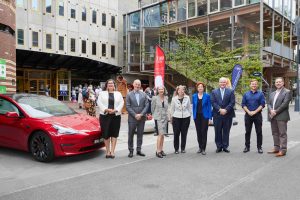The first electric vehicle research facility of its kind in the southern hemisphere will be established at RMIT University in Melbourne’s CBD.
Supporting the Electrification of Victoria’s Future Fleet is a major project bringing government, university and industry partners together around the expertise and infrastructure needed to support widespread adoption of electric vehicles in Victoria.
The $5.2 million funding was announced by the Hon Gayle Tierney MLC under the Victorian Higher Education State Investment Fund (VHESIF).
With transport responsible for around 25% of greenhouse gas emissions in Victoria, Minister Tierney says electrification of transport was critical for tackling climate change, as well as creating new jobs in low-carbon industries.
“This is an important project for the future of clean, green transport in Victoria but also for our plan to meet net zero emissions by 2050 through innovative research and the development of new technology,” Minister Tierney said.
RMIT Deputy Vice-Chancellor Research and Innovation and Vice-President, Professor Calum Drummond, says activity would focus around a new Electric Vehicle Living Lab with EV charging stations, regenerative grid and battery simulators and more.
This critical infrastructure will build on RMIT’s existing microgrid and renewable generation facilities.
“We’ll be developing cutting-edge battery technology and simulating the impacts of wide-scale electric vehicle adoption on electricity grid loading, prices and the broader system,” Mr Drummond said.
“As well as applied technology development, a full-scale applied research project will inform policy towards Victoria’s net zero emission targets in the transport sector, proactively addressing both likely and unforeseen challenges as electric vehicles are adopted at accelerated rates.”
Research lead, RMIT’s Associate Professor Mahdi Jalili, says as well as studying the impact of electric vehicles on the grid, they would also investigate opportunities for electric vehicles to actually support the grid, thus improving the security, reliability and affordability of electricity supply.
The RMIT-led consortium includes Monash and La Trobe universities and industry partners Siemens, City of Melbourne, Centre for New Energy Technologies (C4NET) and CitiPower/Powercor.
“Their joint projects will all focus on the mission of ensuring a smooth transition to sustainable transport in Victoria and supporting the state’s targets, including development of a zero-emission public bus fleet by 2025, and having half of all new car sales zero emission by 2030.
“To this end, the lab will also act as an analysis platform to support critical Victorian Government initiatives and trials. This includes an upcoming study by RMIT and industry partners into the cost, befits and impact of zero emission buses on the electricity grid, based on the government’s three-year electric bus trial.”
C4NET CEO James Seymour says in addition to C4NET’s support of EV research, the development of a consolidated electric vehicle data repository would be another major outcome.
This will include valuable, real-world data on travel patterns, user behaviour, customer responses to tariff signals and details on the performance of various battery technologies.
“This publicly available dataset will support electric vehicle research in Victoria, nationally and internationally, filling a critical gap in capability and complements C4NET’s broader data access service from Victoria’s 2.7 million smart meters,” Mr Seymour said.
The Electric Vehicle Living Lab at RMIT will also provide hands-on learning opportunities for students.
The VHESIF funding initiative behind this announcement was developed in response to the significant impact of the coronavirus pandemic on universities. The investment in RMIT to support pandemic recovery and renewal in Melbourne comes after $44.6 million in round one VHESIF funding last year for development of RMIT’s Social Innovation Precinct.





